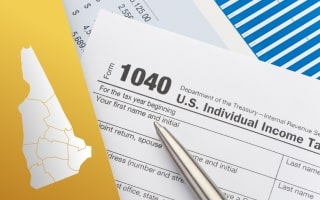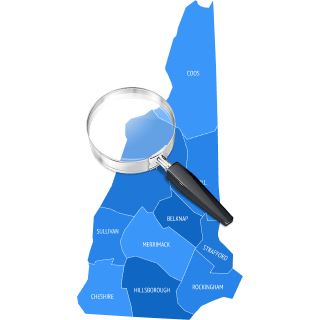Property Tax Records in New Hampshire

When you buy a home in New Hampshire, you'll take on a lot of responsibilities, which include everything from maintaining your home to paying your annual property taxes. New Hampshire has some of the highest property taxes in the country. While each county sets its own property tax rate, the average rate in New Hampshire is 1.77%. The high property taxes are offset somewhat by the fact that the state doesn't collect a sales tax or personal income tax.
Property taxes in New Hampshire are used by county governments to fund public services like school systems and fire departments. The taxes you'll be expected to pay when owning a home in New Hampshire are based on the value of your property and the tax rate in your county. Property values are estimated by the county assessor annually.
You should receive property tax bills twice per year, which means that you can pay your taxes in two installments. You can also attach the bills to your monthly mortgage payments. The initial installment bill must be paid by July 1. The second installment typically has a final due date of December 20.
Real estate has been taxed by New Hampshire as far back as the 17th century. Once New Hampshire became a state, it levied and collected property taxes. Eventually, the counties received some control over property taxes. The primary taxing authority in New Hampshire is the State Tax Commission, which was founded in 1911.
Property Tax Assessment in New Hampshire

One of the reasons why property taxes in New Hampshire are well above the national average is because these revenues are collected by state and county governments. Your property taxes can be comprised of a school tax, a state education tax, a town tax, and a county tax. These taxes are based on the appraised value of your home, which is determined by a local assessor once every year.
The purpose of an appraisal is to identify the market value of your home. However, assessors don't visit properties directly. The market value of your home is set through a mass appraisal of many properties. Since the assessor doesn't look at your property directly, they might make a mistake, which is why the county allows appeals to be filed.
Keep in mind that tax rates differ with each county. These rates are set based on budgetary needs within the counties, towns, and school districts. Like many states, tax rates are displayed in mills. A single mill is equivalent to $1 of tax per $1,000 in your home's assessed value.
In New Hampshire, the assessed property value is the same as the market value. If your home has a market value of $350,000, its assessed value will also be $350,000. Keep in mind that New Hampshire property tax exemptions may reduce the assessed value, which should also lower your property taxes.
Mill rates can vary significantly, which is why it might be easier to consider your county's effective tax rate. For example, the effective tax rate in Sullivan County is 2.78%. If you have a $350,000 home, you'll pay $9,730 in annual property taxes. If you live in a county with a mill rate of 30, you'll owe around $10,500 in annual property taxes on a home that's valued at $350,000. The average tax rates for the most populous counties in New Hampshire are:
- Hillsborough County: 2.23%
- Rockingham County: 2.00%
- Merrimack County: 2.52%
- Strafford County: 2.56%
- Grafton County: 2.08%
Hillsborough County property taxes aren't, surprisingly, the highest in the state. Even though it's the most populous county, others are more expensive. However, as you can see, they don't vary much, and property tax payments in New Hampshire are high across the board.
Calculate New Hampshire Taxes
In New Hampshire, property taxes are assessed and collected at the local level, with each town and city setting its own tax rate based on municipal budgets, school funding, and county obligations. A smart way to understand how property taxes are calculated in the state is to use a New Hampshire property tax calculator. This tool simplifies the process for homeowners and real estate investors by allowing users to enter key property information, such as location, assessed value, and property type, to estimate their annual tax liability based on local rates.
A property tax calculator is especially useful for estimating your yearly tax bill and identifying potential tax savings opportunities. While New Hampshire does not have a statewide property tax exemption, it does offer tax relief programs such as the Elderly and Disabled Exemptions, the Veterans’ Credit, and the Low- and Moderate-Income Homeowners Property Tax Relief Program. These programs vary by municipality, and the calculator can help you determine which exemptions or credits you may qualify for based on your specific situation and location.
using our property tax calculator.
New Hampshire Property Tax Records: What Are They?

In New Hampshire, the county uses your property taxes to fund public services. For example, property tax revenues in Hillsborough County cover the following services:
-
Public schools
-
Fire protection
-
Police protection
-
Hillsborough County services
-
Road maintenance
-
Other municipal services
-
Hillsborough County's portion of the state education tax
If you're in the market to buy a home, you can learn more about it with property tax records. These records can list everything from the assessed and market values of the property to the number of bedrooms and bathrooms.
Even though these records are available to the public in New Hampshire, they aren't provided in online databases, which means that you'll need to use a third-party tool to access them. You can also gain access to these records by visiting the Registry of Deeds, which is open to the public on weekdays. The types of information that property tax records in New Hampshire provide include the following:
-
Property address
-
Parcel ID
-
Owner names
-
Previous sales
-
Current assessed value and market value of the home
-
Property taxes owed and paid
-
Square footage
-
Bedrooms and bathrooms
-
Legal description
-
Building permits and renovation info
-
Maps
-
Photos
-
Sketches
-
Tax district
Property Tax Exemptions and Deductions in New Hampshire

No matter what type of home you own, you may be able to qualify for a property tax exemption. The purpose of most New Hampshire property tax exemptions is to reduce your home's assessed value. However, seniors and disabled individuals also have access to a property tax deferral program.
Low and Moderate Property Tax Relief: If you own and live in a New Hampshire home, you may qualify for Low and Moderate Property Tax Relief. Your total household income must be $37,000 or less if you're single to qualify.
If you are married or file your taxes as the head of household, your total income must be $47,000 or less. The exemption will cover a portion of your property taxes. The exact amount depends on your household income.
Elderly Exemption: To qualify for this exemption, you must be at least 65 years old. You must also have lived in New Hampshire for three consecutive years. If you're between the ages of 65-74, the exemption reduces your home's assessed value by $85,000. Between the ages of 75-79, the amount increases to $115,000. At 80 years or older, you can request a $150,000 reduction in your home's assessed value.
Disabled Exemption: If you have a disability and have lived in New Hampshire for five consecutive years, you might qualify for this exemption. It will reduce your home's assessed value by $75,000. The application must be submitted by April 15.
Blind Exemption: To qualify for this exemption, you'll need to be certified as legally blind by the New Hampshire Services for the Blind and Visually Impaired. The exemption amount is $15,000, which will be taken off your home's assessed value.
How To Search Property Tax Records in New Hampshire

Most states provide the public with easy access to tax records on the county assessor's website. In New Hampshire, you can obtain some of these records in person or by requesting them through the mail. Electronic records are more difficult to come by. However, most of the towns in New Hampshire offer these records, which you can access through the NH Tax Kiosk website.
From here, you can search for property tax records in New Hampshire by owner name, parcel ID, or property address. While these records aren't exhaustive, you'll be able to view information about previous property tax payments and assessment values.
You can also find this information with PropertyChecker, which is a powerful third-party tool that allows users to search for records with parameters like owner name, property address, parcel ID, or phone number. The tool takes around 30-60 seconds to search all public records, after which you'll receive up-to-date info for the property that interests you. The types of information that you'll find in these reports include the following:
-
Lien records
-
Property tax records
-
Owner name
-
Neighborhood details
-
Deeds
-
Property Values
-
Previous sales information
-
Details of the property
-
Foreclosures
-
Building permits
How To Appeal Property Taxes in New Hampshire

New Hampshire makes it easy for homeowners to appeal their property taxes. County assessors aren't always accurate in their valuations. If you believe that your home's assessed value has increased by too much, you can file an abatement application. Take the steps below to appeal your property taxes in New Hampshire.
Step 1: If you receive your Notice of Tax before December 31, you'll have until March 1 to file the abatement application. When the Notice of Tax comes after December 31, you have two months to apply. Your municipality will then conduct an informal review of the appeal, which should occur by July 1.
Step 2: If the initial hearing isn't successful, you can file another appeal with the Board of Tax & Land Appeals. You'll be able to present the same evidence that you gave during the first hearing.
Step 3: The appeals process in New Hampshire is streamlined to ensure you don't need to spend too much time in court. However, the process only allows for two appeals, which is why it's highly recommended that you gather evidence that supports your claim before you file the first appeal.
How Property Tax Records Impact Real Estate Transactions in New Hampshire

No matter where you live in New Hampshire, property taxes are high and impossible to avoid if you own property. Since this is the main tax that's collected throughout New Hampshire, it plays a role in nearly every real estate transaction. Sellers, buyers, and investors must understand how to approach a real estate transaction that involves high property taxes.
Buyers may be tasked with estimating property taxes to determine what their monthly mortgage will be. Most online mortgage calculators include property tax estimates in their calculations. Let's say that you want to buy a property that comes with $5,000 in annual taxes. If you include these taxes in your mortgage payments, your monthly bill will increase by around $417. When you're considering how much you can afford, property taxes need to be part of the equation.
If you're about to sell a home, find your county's tax rate to better understand how appealing your property will be to potential buyers. Cheshire County and Sullivan County have property tax rates of 2.90% and 2.78% respectively. If you live in one of these counties, you may need to offer some incentives to ensure you receive offers for your home. The state of the local real estate market determines how easily you'll be able to sell your home. When prices are high, some buyers avoid purchasing properties in counties with elevated tax rates.
Property taxes are also a major concern for investors. Adding hundreds of dollars per month in property taxes makes it more challenging for an investor to profit from their investment. One of the only solutions is to charge a higher rent to tenants. Investors can use property tax records in New Hampshire to identify the most recent tax amounts and estimate how much they'll pay once they make the purchase.
Towns and counties often host property tax sales that investors can participate in. If a homeowner doesn't pay their property taxes on time, a lien will be placed on their home. This process starts 30 days after the tax due date.
The homeowner will first receive a Notice of Delinquency about their unpaid taxes. This notice is typically mailed in February and includes the amount of taxes owed as well as any interest that has built up. The lien will then be recorded at the local Registry of Deeds. Interest accumulates at 14% per year.
The homeowner will then have two years to repay their property taxes. If the lien amount remains unpaid by the end of this period, the municipality can obtain and sell the property. Investors can bid for these properties at tax sales. Understanding the process and timelines can help investors navigate these opportunities more effectively.
Free New Hampshire Property Tax Lookup
Tax Records Please wait...
Property Tax Guide
- Property Tax Records in New Hampshire
- Property Tax Assessment in New Hampshire
- New Hampshire Property Tax Records: What Are They?
- Property Tax Exemptions and Deductions in New Hampshire
- How To Search Property Tax Records in New Hampshire
- How To Appeal Property Taxes in New Hampshire
- How Property Tax Records Impact Real Estate Transactions in New Hampshire
Instant Access to New Hampshire Property Records
- Owner(s)
- Deed Records
- Loans & Liens
- Values
- Taxes
- Building Permits
- Purchase History
- Property Details
- And More!
Free New Hampshire Property Tax Lookup
Tax Records Please wait...
Property Tax Guide
- Property Tax Records in New Hampshire
- Property Tax Assessment in New Hampshire
- New Hampshire Property Tax Records: What Are They?
- Property Tax Exemptions and Deductions in New Hampshire
- How To Search Property Tax Records in New Hampshire
- How To Appeal Property Taxes in New Hampshire
- How Property Tax Records Impact Real Estate Transactions in New Hampshire